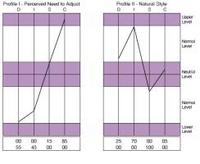DISC Case Study - Understanding a Person's Conscious vs. Unconscious Behavioural Style) Recently, a consultant had doubts as to the accuracy of a Personal Analysis Report and it was interesting to realise why there was some confusion over the report.
The two Profiles in the report are shown opposite.
To find out how Extended DISC can help your business, contact us at Talent Tools on 1800 768 569 or Outside Australia on 61 3103 0177 or email us.Author:EDA & Talent Tools |





